In the wake of 9/11, Israel’s defense industry boomed, positioning itself as a key beneficiary of the "war on terror." Loewenstein explores how private Israeli companies market their surveillance technology—tested first on Palestinians—across the globe, claiming to have the answers to address ‘global insecurity.’ In reality, it results in tighter borders, greater monitoring of refugees, and increased state surveillance. We hear from Palestinians about how these repressive tools are being used today in both Gaza and the West Bank. Can democracy exist in a society under mass surveillance? And, does it actually make us any safer?
Guests: Jez Heywood, Andrew Feinstein, Mona Shtaya, Mariam Dawas
The Palestine Laboratory Podcast is Drop Site’s first investigative series, looking into how Israel is using Palestinian territories as a testing ground to develop its occupation-enforcing tech industry. Hosted by investigative journalist Antony Loewenstein and based on his recent book, this podcast series examines how Israel is reshaping conflict and population control globally. What happens in Palestine never stays there.
Credits
Host: Antony Loewenstein
Series Producer: Elle Marsh
Producer: Bethany Atkinson-Quinton
Production & Sound Engineering: Tim Jenkins
Field Recording: Cinnamon Nippard
Studio Recordings at 2SER: Michael Jones and Jonathan Chang
Original Music: Ara Koufax
Music Direction: Sunless Studio
Podcast Artwork: Debashish Chakrabarty
Special Thanks: Anu Hasbold
Additional music in the series is from: Use Knife, Muqata'a & The Album Leaf
[MUSIC PLAYS]
Antony: Welcome back. I’m Antony Loewenstein and this is The Palestine Laboratory Podcast.
In the last episode we looked at how after the 1967 Six-Day-War, Israel sought to establish diplomatic power by selling its “battle-tested” weapons in Palestine around the world to anyone who wanted them.
In this episode, we’ll be looking at the surveillance tech that comes out of Israel and how Israel and its defense industries profit in the wake of 9/11.
Andrew: In order to be able to do the business they do, they rely on government to ensure that their citizenry is permanently terrified.
Antony: In the occupied West Bank, checkpoints, cameras, surveillance towers, and phone hacking, are a part of daily life for all Palestinians.
Mariam: We know in Gaza that we are spied on by drones and by mobiles. We know that. But we don't have any other choice.
Antony: But what happens in Palestine doesn’t stay there. Private Israeli companies market these repressive tools to states around the world, claiming that they have the answers to address global insecurity. What this means in practice is higher walls, tighter borders, greater surveillance of refugees, facial recognition, drones, smart fences, and biometric databases.
Antony: We've seen helicopters flying nearby, patrol cars, and almost certainly they're looking at us from the cameras on the fixed towers.
Antony: But does this actually make us safer? And can democracy exist in a society under mass surveillance? Episode 3: Privatizing the Occupation.
[Seatbelt clicks in]
Antony: I’m just going to turn the engine on and get the heater because it's really, really cold, winter in Sydney.
Antony: After years of living in Palestine, in 2020, my partner Ali and I left East Jerusalem and moved back to Australia. Back at home, I continued to research Israel’s surveillance and security tech industry and learned that the tech made by Israeli firms was also being used here.
Antony: So we are just crossing the Harbor Bridge in Sydney, and we're going towards North Sydney, where pretty much unbeknownst to most people, there is an office for the Israeli company Cellebrite.
Antony: Cellebrite is a multi-billion-dollar digital intelligence company with its headquarters in Tel Aviv, but they also operate all over the world, including here in Australia.
Antony: What we're seeing is high-rise buildings. With corporate offices really in North Sydney. It's not a part of the city I come to very often.
Antony: The company is staffed by many former Israeli military and intelligence officers and is known for selling technology that allows governments, police, and intelligence agencies to access and hack data.
Antony: Jez, hi, great to meet you.
Jez: Good to meet you!
Antony: Thank you so much for coming.
Jez: No worries. No worries.
Antony: It’s wonderful to see you.
Antony: Jez Heywood is a quiet, passionate man with nervous energy. He’s the president of the Australian Unemployed Workers Union. He spends his days advocating for unemployed people who are dealing with the welfare system.
Jez: I did walk into the foyer before.
Antony: Okay.
Jez: And it's not listed on the screen that says.
Antony: How interesting, which I'm sure is not accidental.
Antony: The Australian government agency Services Australia, which administers welfare to people like students, the unemployed, and single parents, has used Cellebrite’s tools and has been publicly accused of accessing welfare recipients’ data.
One welfare recipient and mother, Julie, had been receiving carer payments for her 17-year-old autistic son since 2014. Local media outlet IT News reported last year how after the government agency accessed her phone and laptop data, she was accused of being in a relationship. Services Australia alleged she was overpaid and demanded she pay the agency $80,000 Australian dollars. That’s over $51,000 U.S. Dollars.
Julie's lawyers believed Cellebrite software was used to access her phone.
Antony: What does that do to those people? The people you often deal with everyday with your job.
Jez: It terrifies them. You know, and so you're already financially strapped. You're stressed about, how are you going to pay your bills? How are you going to afford your medication? And then you've got this government with its creeping data tentacles slowly wiggling into every aspect of your life.
Antony: And it's not just being used here in Australia. Cellebrite is marketed to countries all across the globe. Cellebrite has allegedly sold its wares to Uganda’s brutal dictatorship and to Chinese authorities, where border guards in Tibet have reportedly used it to search people's WeChat accounts.
[Archive Recording] Across Russia there have been many thousands of arrests. Russian social media accounts. Some posts more cryptic than others because the stakes are so high.
Antony: In 2022, it was confirmed that Russia’s “Investigative Committee” was continuing to use Cellebrite’s tech on anti-Putin activists.
[Archive Recording] By late afternoon, nearly 4,000 people had already been detained in 53 cities across the length and breadth of Russia.
Antony: Despite Ugandan authorities admitting in 2022 that they had acquired Cellebrite’s phone-hacking tools, when we reached out to the company for comment, they said quote “Uganda is a banned country that we do not sell to.”
One former Cellebrite employee wrote anonymously in the Israeli newspaper, Haaretz, saying the company had lied to them. They wrote, quote, “I can say from personal experience that the company does nothing to prevent the abuse of its products by customers.” In their statement to us, Cellebrite also said they no longer sell to Russia or China and that the company is quote “committed to creating a safer world.”
This track record has not impacted Cellebrite finding clients here in Australia at all. At the time of this recording, Australian government agencies had secured 153 contracts with Cellebrite.
Jez: it's always creeping further and further into everybody's lives. And we're talking about the most vulnerable members of society here. Yet the government is using the tools of an oppressive, genocidal apartheid regime to, you know, claw back a few dollars from desperately poor people.
Antony: Now Cellebrite is just one of many Israeli security firms that has set up shop around the world, and as we touched on in the first episode of this series, while these are private companies, many are staffed by former IDF intelligence officers.
To understand the expansion and proliferation of companies like Cellebrite, it’s worth going back to the early 2000s.
[MUSIC PLAYS]
On the evening after the September 11 terror attacks in 2001 on New York and Washington, Benjamin Netanyahu, who was at this time Israel’s former prime minister and soon to be its foreign minister, was asked by a U.S. reporte what the attack meant for relations between the U.S. and Israel. In the interview, he immediately replied, quote, “It’s very good.” Then he quickly corrected himself, saying, quote, “Well, not very good, but it will generate immediate sympathy.”
[Archive Recording] Israel has been on the front line of fighting terrorism for a long time. And in fact, we've been fighting this kind of militancy, which has its roots in centuries of resentment against the West.
Antony: For many, 9/11 was a moment that drew the U.S. and Israel’s bond even closer than before.
[Archive Recording] Our enemy is a radical network of terrorists and every government that supports them. Our war on terror begins with al-Qaeda, but it does not end there.
[Archive Recording] It's as close an alliance as you can have. And we will help in any way that we can.
Antony: It turbocharged Israel's defense sector and internationalized the war on terror. Other countries began to turn to the Jewish state to claimed that it had been fighting terror for decades.
[Archive Recording] So for these militants, they don't hate America because of Israel. They hate Israel because of America, because they see Israel as an outpost of Western values and the very freedoms and liberalism in the larger sense of societal freedoms that they despise. Because of that, Israel has been fighting at the cutting edge between this terrorist militancy and the West.
Antony: Only a few short months after the September 11 attacks, U.S. law enforcement delegates attended their first official training expedition to Israel to exchange quote “best practices” in “counter-terrorism.” But military tactics weren't all they got from Israel. In many ways, the Bush administration adopted a similar rhetoric around terrorism that Israel had been using for decades.
[Archive Recording] They understand what some of us have been trying to say for so long that the threat of international terrorism is not tactical. It's not a minor thing, that it actually threatens our way of life and our civilization.
Antony: Before the 2000s, many Israeli defense companies involved were government-owned. This began to change after 9/11. With support from the state, Israel’s private-security industry boomed. Companies were encouraged to form close ties with America’s emerging cyber and security industries.
Current Israeli Prime Minister Benjamin Netanyahu, who through the 2000s served in a number of major ministerial roles and then later became prime minister again himself, when he talks about this period, Netanyahu explains how through government reforms, the state supported their military personnel to create profitable private security companies.
[Archive Recording] So the policy we have is keep taxes low and keep regulations low. Minimize regulations. There is no industry more susceptible and more inviting of regulations than cybersecurity. It's like weapons. It is a weapon!
Antony: Benjamin Netanyahu is Israel's longest-serving prime minister. He’s also Israel's fourth-richest politician. The son of a famous “revisionist Zionist” historian, Netanyahu went to school in Philadelphia in the U.S. before returning to Israel in 1967 to join the IDF. The right-wing leader rejects the idea completely that Palestinians should have their own state, and touts a type of Jewish supremacist thinking that is now shared by an increasing number of Israelis.
As a strong supporter of the capitalist free market, Netanyahu saw the war on terror after 9/11 as the perfect business opportunity for the state of Israel and its high-tech defense sector. And since the early 2000s he played a critical role in privitazing Israel’s economy and growing its defense establishment. He says he wants to be remembered quote, “as the defender of Israel and the liberator of its economy”.
Andrew Feinstein: The reason Benjamin Netanyahu in Israel would have been such a huge proponent of the war on terror is because of Israel's role in the global arms trade.
Antony: Andrew Feinstein is a leading expert in the global arms trade. He talks about how the arms industry and security state capitalized on and accelerated in the wake of 9/11.
Andrew: So probably a better place to talk about why the war on terror was so important for the arms industry. Better than me as a source would be some of the arms dealers I've interviewed over the years. So these are people who are constantly making money out of the arms trade. And they all acknowledged to me that in order to be able to do the business they do, they rely on governments to ensure that their citizenry is permanently terrified. So they need a threat. They need at least one enemy, preferably more than one enemy. And this is the way that governments and individual politicians justify ever-increasing budgets for defense, and thus for the purchase of weaponry or the sale of weaponry.
Andrew is an incredibly interesting man. He wears many hats: He’s a campaigner and author of “The Shadow World,” a book on the global arms industry. He left office in South Africa to expose massive corruption in the government there and has been working with a team of researchers ever since to investigate this shadowy arms trade.
Andrew: Amnesty International often says the global trade in weapons is less regulated than the global trade in bananas. And very sadly, that's true.
[MUSIC PLAYS]
Andrew: I know of no other trade that has this reality, that there is regulation in place, and it's consistently and systematically ignored by those who have an obligation to enforce it. And it's for that reason that we talk about the global arms trade as the least regulated of all the international trades. One of the primary reasons for this lack of regulation is not only to give executive arms of government absolute carte blanche in terms of who they do and don't export arms to. But because this trade is by far the most corrupt of global trades, accounting for around 40% of all corruption in all global trade. What allows it to operate in this illegal way? Because that is what it is. It operates in a corrupt, illegal manner. And it's the fact that everything that happens on an arms deal is hidden behind a veil of national-security-imposed secrecy.
Antony: What the U.S.-led war on terror created after 9/11 in many, many countries across Europe, the Western world, and, frankly, much of the global South, was the so-called justification for a massive expansion of military and security spending.
Andrew: Now I'm not for one moment suggesting that 9/11 was in any way some sort of creation of this national security elite. But when 9/11 happened, they did realize that this was what they required. But in order for it to benefit the defense industry, the militarist mindset, they needed to respond to it in a particular way. They decided to give it this name of the global war on terror. And what does that mean? That means we are in a permanent state of war, and anybody can be an enemy.
Antony: Before 9/11, many Western states and repressive states already had a system of mass surveillance. But after 9/11, this accelerated. Mostly really because there was a political decision that huge amounts of populations were suspect. Could be Muslims in America. Palestinians in Palestine. Tamils in Sri Lanka. In many, many countries, there were so-called justifications for a huge expansion of mass surveillance, which also came at a time of the digital revolution where it was much easier to surveil people.
Andrew: 9/11 was an absolutely pivotal moment in Israel's political economic development. Because here suddenly we saw defense budgets skyrocket to levels that we never thought imaginable. But this provided the moment where the focus could move, to an extent, perhaps more than in any other country besides possibly the United States of America, towards national security, defense, and homeland security.
Antony: As David Lyon, a Scottish sociologist and expert on surveillance studies, has written, 9/11 was a quote, “wholesale reimagining of what societies would look like in the 21st century.” In this reimagined society, mass population surveillance, security, and border patrol was now a necessity.
[MIDROLL]
This drive for “security” is starkly visible in Israel’s policies. They maintain that these measures are essential to prevent potential attacks. And nowhere is this more evident than in the West Bank. This occupied Palestinian territory is where some of the toughest surveillance and border-patrol measures are trialled. For the estimated 3 million Palestinians living in the West Bank, which is roughly the size of Delaware in the U.S., militarized life and mass surveillance has become normalized. The Palestinian territory has been under military rule since Israel occupied the region in 1967. Within this militarized zone, a lot of private Israeli tech and security firms operate and test out their gear.
Now the West Bank includes places like Bethlehem and Hebron. It's a relatively small place, populated largely by Palestinians, but also, of course, increasing amounts of Jewish settlers, many of whom are fundamentalists. I first visited the West Bank nearly 20 years ago. And so many people see this area as a war zone, but actually it's also a place of beauty and tranquillity. It has striking landscapes with rolling hills and huge areas populated by its famous olive groves. Now some don't realize that Jerusalem is just down the road, but to get to most towns in the West Bank, you have to go through Israeli checkpoints. And these checkpoints control every aspect of Palestinian life. While the global war on terror reshaped security policies worldwide, here it is deeply personal and pervasive.
Mona: Living in the West Bank on a daily basis is a complex story whenever you want to tell it to someone who doesn't live here, because living here means you are watched in every single moment.
Mona Shtaya is a Palestinian digital rights activist, and her work focuses on surveillance using an intersectional lens between Palestine and different countries around the world.
Mona: So I live in the occupied Palestinian territory in the West Bank. I grew up in Salfit, which is a small city, and, in the past few years, I moved to Ramallah. So I am based in Ramallah right now, and maybe I should tell you how it's means when you move between different cities in the West Bank, especially when you have family in another city and you live in a different city. When you move in the streets between cities, you can observe and witness the different, heavy loaded, military checkpoints that we pass through. So if I want to visit my mum in another city in Salfit, for example, I have to pass at least through two checkpoints. There are soldiers, and they're standing there most of the time. They're stopping us for hours whenever we're passing.
Antony: She says it shouldn’t take her more than 40 minutes to get there, but in reality it takes her a lot longer. According to the United Nations, there are approximately 645 checkpoints and roadblocks set up across the West Bank and East Jerusalem that restrict the movement of Palestinians. Of more than 30 checkpoints that connect Israel with the West Bank and Gaza, it’s estimated that roughly half have been fully or partially privatized, being operated and staffed by private security personnel.
Mona: It's not like private sector and government sector. It's not. It's a loop that feeds into each other and that produces every day new technologies that serve the main interest, which is make the population control of people easier.
Antony: In 2020, a new surveillance program called Blue Wolf began to be rolled out across the West Bank. The software takes photos of Palestinian faces and matches them to a database. And like all good apps, it's been gamified, according to the Washington Post, in 2020 Israeli military units competed for prizes to collect the most pictures of Palestinians.
Mona: They call it the Palestinian Facebook or Facebook for Palestinians, where they are profiling Palestinians, putting our data back in the wolf pack server that what they call it's. And it's about profiling, linking you with your family members. It's about collective punishment, because when you are linked with other people in your family or in your society, it's not like you are just a singular human being. You might be denied your right to get a health permit to go to Jerusalem, for example, just because one of your family members might be, according to the Israeli system, a security threat.
Antony: According to Amnesty International and many other human rights bodies, Israel is increasingly relying on facial recognition in the occupied West Bank to track and restrict the passage of Palestinians.
Mona: For someone who's in the field, we know that there is also the facial recognition, where we are profiled, where we are dehumanized. We are merely numbers, we are merely data. And it aims, at the end of the day, to create this feeling of panopticon, where you feel that you are watched wherever you walk, wherever you go, and you quote unquote, “behave at your best.”
Antony: She hears stories about how Palestinian women inside their homes don’t feel comfortable to take off their hijab.
Mona: It's not only about finding soldiers on those checkpoints. You can see CCTV cameras. You can see how those CCTV cameras are affixed everywhere, getting all the angles on that checkpoint. You can see how they are controlling or militarizing our civic spaces, our normal streets, our on the ground places. And whenever we're speaking about that, it's just to spread the fear. So here we're speaking about a whole surveillance system.
Antony: Unit 8200, which is Israel's intelligence arm equivalent of the US’s NSA, listens to and monitors all communications with Palestinians in the occupied territories. So Palestinians know that what they post online — Facebook, Instagram, TikTok, whatever it may be — who they’re speaking to, who they are communicating with, both within Palestine and globally, is being listened to and monitored.
Mona: They started also checking your phone whenever you are passing. And I'm not saying they are checking every single phone. But they are checking phones. So you might be beaten, arrested, based on what they find on your phone. And you know we want to see what's going on with our people in the Gaza Strip. So we are watching the news. So if you have such kind of content on your phone you would be criminalized, which is insane and terrifying.
Antony: I don't think there’s really any doubt that if you ask, and I have over the years, Palestinians under occupation, do we live in a system of freedom? The answer, of course, is absolutely not.
Mona: The chilling effect is killing us, is preventing us from mobilizing and organizing ourselves. And to have this Palestinian discourse about what we want and how should we think about the day after or the Palestinian future, because of the whole chilling effect that threatens us all the time.
Antony: This intense level of surveillance that Mona and other Palestians face comes from Israel’s belief that anyone could be a potential terrorist. So everyone needs to be monitored and controlled. And of course, this isn’t just happening in the West Bank. It’s even worse in Gaza.
Now, I've been visiting Gaza since 2009, and it's always a very surreal experience. I entered from the Israeli side. It's about an hour and a quarter from Jerusalem, and when you arrive in this huge warehouse and whenever I went in there, I always had to go through lots of security. The Israeli officials would always say to me, based on my name, are you Jewish, yes I am, why are you going in there, you’re going to be killed, it’s full of terrorists. I said, I'm a journalist. That's what I do. And then to go from Israel into Gaza, there's this long, long, almost like a cage that you walk along. And on either side you can see through the cage. I remember distinctly seeing from 2009, every year I've been there since, just destroyed homes, Palestinian homes that have been bombed by Israeli wars over the last 15 or so years.
As intense as it was for me to cross from Israel into Gaza, Mariam Dawas, my Palestinian friend who was living in Gaza until earlier this year, told me about what it's like for her to cross into Israel. You might remember her from episode one.
Mariam: We have been deprived our rights of everything, like movement, travel, medical treatment. I don't think that people know much about this, but we are really isolated. I cannot go to Jerusalem. I cannot to go to the West Bank. I cannot go to anywhere in Palestine.
Antony: In 2013, as part of her Masters in International Relations, Mariam got the chance to New York to study abroad for a semester. But to get her American visa, she was required to go to the American consulate in Jerusalem. The main way to enter Israel from Gaza was through the Erez crossing at the northern end of the strip. She applied for a permit to enter Jerusalum from Gaza and waited two months just for a response. Then she was told that if she wanted to enter Jerusalem to get her visa, she needed to go to the Erez crossing for a security interview with Israeli authorities.
Mariam: I was really terrified to go through a security interview because I've asked some people what happens there. They told me it's a nightmare.
At first Mariam wasn’t even sure she should go through with it.
Mariam: But then I have been encouraged by the program and by my friends. You have nothing to worry about. You can go and try your luck. And I did, which I regret. I was dehumanized, humiliated.
Antony: From the moment Mariam arrived at her security interview, she was treated as a suspect.
Mariam: They took all my clothes off. They took a machine that was going on my body to see what I'm hiding. And then they asked me, they asked me to put a number. They didn't take my phone. They only asked me to put a number on my phone and then turn it off which I did, I have to. And then they took me to another place out of Erez crossing, under the ground. And then you go up to another building. You don't know where you are. If you disappear, no one will ever know where you are. And then, they made me wait and wait and wait in a dark room with no chairs, And they were playing on your mental condition.
Antony: An Israeli officer finally arrived to interrogate her.
Mariam: He told me that we have nothing on you. But you are entering the Israeli state. And everyone who enters the Israeli state, we have to make sure that he is not a terrorist.
On the advice of others in Gaza, Mariam had left her smartphone at home. She was told if she didn’t want officers going through all her personal photos then she should bring along a different phone. But it didn’t matter, it seemed like the officer knew everything anyway.
Mariam: He told me about the last message I got even though he didn't get my phone. He told me, who's that one? Who sent you that message? He's your relative, your cousin? And it was my fiance. And then I was asking myself, how did he know? He didn't take my phone. My phone is just with me, you know? And then he asked me to work with him. He told me, what are you going to do in U.S.? And I told him that I'm going to do my Masters in International Relations. He told me that what if we can make you do your Masters, we give you a scholarship, and you come back and work with us through international organisations? I told him, no, I'm not going to do this. He told me why? I told him I'm not a spy. I told him because you’re making it an unlivable place.
[MUSIC PLAYS]
Mariam: Could you permit anyone to do what has been done to me? If you are entering any place in this world, would you accept that? I don't.
So he changed the subject, and he showed me some pictures of people who seemed familiar to me. He told me, don't lie. If you know them, tell me. I told him. I don't know them, they seem familiar and maybe they are from the neighborhood around me. But I don't know their names but they seem familiar.
And then after all of that, he sent me back to Gaza. And I didn't go to Jerusalem. I went the next day. And I got an email in Hebrew and a Facebook account that added me that had no friends, only me, and it was in Hebrew. I was really terrified because I'm not going to spy, that's for sure. But they can control you to that extent that they can. I know. Some stories that they can force you to, if they have anything on you, they can force you to do. So I only thanked God that they. Don't have anything on me.
Antony: Various Israeli intelligence veterans from the notorious Unit 8200 have admitted that the work of the Unit involves extortion, harassment, and threats. They’ve blackmailed gay Palestinians, threatened Palestinians with health issues, or cut off essential medical care if they did not comply. Another anonymous former Israeli Intelligence officer I spoke to told me how he realized the occupation was not about self defense or security. Instead he saw Israel was ruling a civilian population with no rights under a military dictatorship.
Mariam: We know in Gaza that we are spied on by drones and by mobiles. We know that. But we don't have any other choice.
Antony: As we now know, what's developed and tested in Palestine, doesn’t stay there. This surveillance tech is exported to countries all around the world, especially those looking to get tough on border security.
Antony: We've seen helicopters flying nearby, patrol cars, and almost certainly they're looking at us from the cameras on the fixed towers.
Antony: I’ve been travelling the world documenting the spread of this type of tech and one of the places it exists is on the U.S.-Mexico border.
Antony: I'm standing literally underneath one of the Elbit integrated fixed towers. It's about 10 miles from the U.S.-Mexico border, and there's around 50 of these all across Arizona. And they talk to each other. The towers speak to each other it’s about surveillance, monitoring.
Antony: These massive towers are set up with the sole purpose of tracking who goes in and out of the U.S.. And of course, they’re built by Elbit, Israel’s biggest defense company.*
Antony: It's almost, on the one hand, feels like quite benign because the towers themselves are not weapons, and yet it's hard not to feel like they're part of this massive militarization of the U.S. border.
Antony: And it’s not just migrants they monitor. Native Americans often say that they don't feel safe or private in their own territory. That is land that is historically theirs, and that these surveillance towers make privacy an impossibility. This is not simply something that came into place during a Republican administration. In fact, it began during a Democratic administration many years ago during the Obama era, continued during the Trump era and it's been finalized during the Biden era.
Another example of how Israeli surveillance tech is used by Western countries is the European Union. In the last few years, they’ve massively reduced their use of patrol boats and instead, deployed unarmed Israeli drones to monitor people from Africa and the Middle East trying to cross the Mediterranean by boat.The result has been a huge spike in drownings of principally Black and brown people, numbering in the thousands.
The border industrial complex is soaring. It's estimated to be worth next year around $68 billion. U.S.-Mexico border, so-called “fortress Europe,” Australia, the UK — and Israel is profiting from its massive growing border security industry, using the West Bank and Gaza as examples of just how tough you can be on border control.
We seem to be moving to a world in the 21st century where there's not really the concept of a global community. It's very much us versus them. There's never been more people moving around the world looking for safety than now, since World War II. We're in an unprecedented era, and rather than addressing that logically and sanely, in fact, what the West is increasingly is doing, with tech bought from Israeli companies that's been tried and tested in Palestine, is trying to keep people out and surveil entire populations.
But the impact of this is not that societies are made safer. In fact, what it does is it makes societies more paranoid and insecure. And mass surveillance is a tool used by anyone in political office to target their enemies or, frankly, their own populations.
Mona: The whole surveillance state is profitable. You are creating a profitable colonial system where people are not only dehumanized, are not only downgraded, are not only oppressed because they are occupied. It's more than that. Unfortunately, different, oppressive regimes around the world are getting those systems or technologies, because there is a whole chain of violence around the world where we're oppressors are collaborating to oppress people for different reasons.
Antony: In the next episode of The Palestine Laboratory, we’ll investigate October 7. We’ll look at the Hamas attack on Israel and the Jewish state’s brutal response. We’ll also uncover how Israel has been live-testing new weapons and forms of surveillance in Gaza and trying to sell them at global arms fairs.
[CREDIT MUSIC PLAYS]
The Palestine Laboratory Podcast is hosted by me, Antony Loewenstein.
The series is produced by Elle Marsh and Bethany Atkinson-Quinton. Production and sound engineering by Tim Jenkins.
Studio recordings at 2SER in Sydney with Michael Jones and Jonathan Chang. Field production by Cinnamon Nippard.
Original music in this series is by Ara Koufax and music direction by Sunless Studio. This last track is Coupe d'état, by Use Knife remixed by Muqata’a.
A special thanks to Anu Hasbold, and our guests for this episode Jez, Mariam, Mona and Andrew.
This is an independent podcast brought to you by Drop Site News. To support Drop Site's journalism and get 20 percent off a subscription, visit dropsitenews.com slash palestinelab.
Thanks for listening.
-END-
* We asked Elbit Systems for comment regarding the company’s technology on the US/Mexico border and they didn’t respond


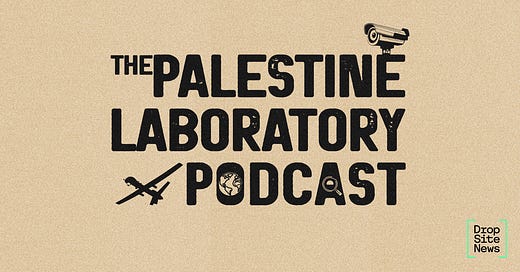



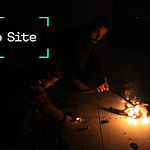
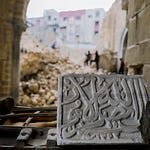

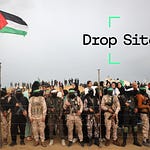
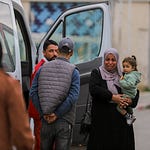
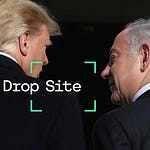

Share this post